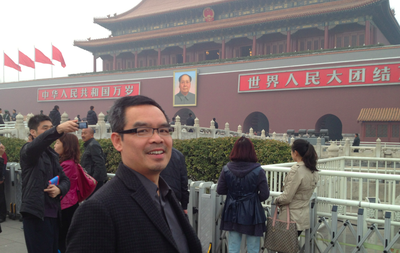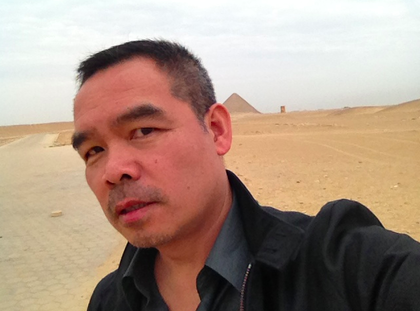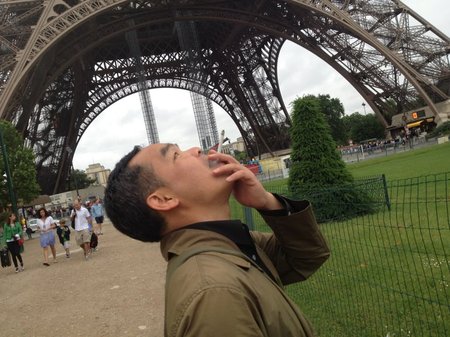My mother still remembers me as a happy Vietnamese child whenever I got to fly in an airplane during the Vietnam War. Flying was full of risks and dangers back then, but I was apparently a bouncy and cheerful little boy. Other passengers fretted and prayed yet it would seem going somewhere, anywhere, always got me going.
That impulse to travel hadn't changed much for me as an American adult, though it comes with certain wariness. Images of the horrifying wreckage of Malaysian airline flight MH17 in eastern Ukraine and with the news of Air Algerie flight AH 5017 crashing in the Mali desert were on my mind as I went online this morning to buy a ticket for my next destination -- Ubud, Bali, to attend the literary festival in the Fall then to Singapore and Hong Kong.
I love to travel. But I travel these days with this knowledge: There's always a chance that you won't reach your destination.
It does not deter, of course. Not long ago the ability to cross international borders belonged only to the powerful and rich. The borders for the rest were as impervious and as real as the Great Wall of China. Much has changed since the Cold War ended, however. Travel has become increasingly possible for the many. Immigrants move. Tourists visit. Refugees resettle elsewhere.
Indeed, we live now at a time when freedom of movement is recognized as a basic human right and the business of travel -hotels, transportations, tours, cruises, restaurants, conferences -- has evolved to become among the top 10 largest industries in the world.
And the tourist dollar changes the world. Costa Rica's spectacular rain forest has not been cleared for cattle grazing (as in neighboring countries) largely because tourism is seen as more important than cattle. And many ruins -- Angkor Wat in Cambodia, or the Valley of the Temples in Burma -- are being restored and traditional dances upkept thanks to foreign demands.
Over 100 million people have jobs in the tourism and related industries around the world, according to the World Travel Organization. Some most visited cities -- Paris and Singapore and Istanbul or even here in San Francisco -- might unravel economically without tourism. In some countries like Egypt and Thailand, the tourist dollar is the prime source of income.
Travel changes both travelers and the places they visit. In Vietnam, English has become the second language of choice, thanks to so many foreign visitors yearly and foreign investments. Locals begin to read and watch the news in English, learn more on the Internet than they could possibly get from the local government-sanctioned media. In the last 10 years, many Vietnamese, too, begin to travel overseas.
China, too, is emerging as the largest tourism market in the world with nearly 100 million citizens traveling abroad last year. No doubt, the power of the state weakens when its population possesses the power of flight; the ultranationalist narrative is complicated by the citizen's multilayered, transnational references and connections, a cosmopolitan reality.
"Travel is fatal to prejudice, bigotry, and narrow-mindedness," Mark Twain once noted. No wonder those with a fundamentalist mindset often resent the commercial plane. In their efforts to rebuild and fortify artificial demarcations, the plane renders the borders porous. It is perhaps why they turned airplanes into bombs or else they'd shoot them down from the sky.
The globalized world has become too interconnected, and too integrated, however, for travel to be reversed by fear. Commercial jets are now rerouted to avoid flying over Ukraine's airspace but flights continue more or less unabated.
If terrorism is a radical act, so is, in a sense, the act of traveling itself. In that C-130 full of refugees out of Vietnam, I was moving not only across the ocean, but also from one set of psychological understandings to another. I was once land bound, but these days my connections are global, with friends and relatives in Vietnam, New York, Paris and many other countries. My imagination, once bound by a narrower sense of geography, expanded its reference points across time zones, continents.
I mourn the loss of MH17, its 298 passengers and crew, and all those others who never reached their destinations. But, despite all the bad news, I am also committed to traveling overseas now more than ever. For in the end, it is not fear or fundamentalism, but relentless human movement that shapes and reshapes the world.
Andrew Lam is an editor with New America Media and author of the "Perfume Dreams: Reflections on the Vietnamese Diaspora," and "East Eats West: Writing in Two Hemispheres." His latest book is "Birds of Paradise Lost," a short story collection, was published in 2013 and won a Pen/Josephine Miles Literary Award in 2014.


